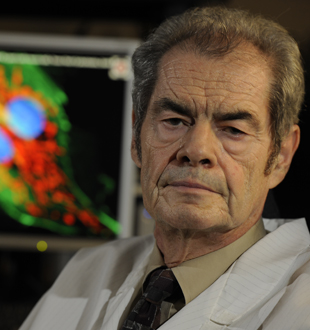| Future Students | Students | Scholars & Faculty | Alumni & Global Community | Donate |
Russian Professor is One of Auburn’s Most Prolific Researchers
AUBURN – One would think there would be a major culture shock moving from Leningrad (now St. Petersburg, Russia) in the former U.S.S.R. to New York City during the Cold War.
Fortunately for Auburn professor Vitaly Vodyanoy, science remains the same in any language or culture.
"I was lucky; when I came on May 8, 1979, in New York City, the next day I had an interview at NYU, New York University, and I got a job," Vodyanoy said. "So I got a job and started coming to my work every day. I received a lab and an office, just as I had in Russia. I worked very hard every day, just as I had in Russia, so I didn’t have culture shock because of this.
"But I liked New York City. It’s a very culturally-rich city, very high diversity of culture. If you wish you can listen to chamber music every day or go listen to an orchestra or walk around museums."
After three years in NYU’s Chemistry Department, Vodyanoy accepted a position at the University of Calfornia, Irvine’s Physiology and Biophysics Department, where he served for seven years before finally reaching his long-term destination – Auburn’s College of Veterinary Medicine. He works as a professor of physiology and as director of the college’s biosensor laboratory.
"I was looking for a tenure-track position. I sent out about 150 applications at the time. You would be surprised; I received three invitations for interviews – one in Birmingham, one in Mobile and one in Auburn. I was offered a job here first. Later I found I would have made it in all those places. But I’m glad I’m here. It’s the preferable place for me," Vodyanoy said.
He again adapted quickly to a new lifestyle, leaving major metropolitan areas for the more laid-back and pleasant living conditions of Auburn. Larger cities such as Atlanta and Birmingham are nearby, should he want to recall city life from time to time.
"Most of my life, I’ve lived in cities. But it was very easy to get adjusted to the good life here," he said.
Vodyanoy is a research dynamo, keeping several irons in the fire at a time as he studies his diverse research interests in the physiological world.
Recently, a research team led by Vodyanoy and microbiology professor Iryna Sorokulova discovered a biosensor that can identify certain types of bacteria in a matter of minutes rather than hours. This is especially important in treating antibiotic-resistant bacteria, which can be difficult to diagnose, and often needs to be treated as soon as possible.
Additionally, Vodyanoy has a long-standing research project dealing with olfaction – the sense of smell – and how odor translates into electrical events in the olfactory receptor in the brain. He has recently discovered particles that enhance the sense of smell.
"I also have one interesting project on preservation. We have found, again, a very interesting biopolymer. This polymer is interesting in one respect. We can immobilize a cell in this polymer, and it can be preserved for a very long time. It won’t even need refrigeration," Vodyanoy said.
He also is involved in study of the relatively new area of the primo-vascular system, which is thought to assist in healing wounds and regenerating damaged tissue in animals.
The freedom that comes with working at an American academic institution, especially being able to focus his studies in whatever areas that interest him, keeps Vodyanoy motivated to take on so much research. Most of his work is in research, though he also teaches a course on membrane physiology and assists professors in other courses where he can share knowledge from one of his fields of expertise.
"All of my life I’ve worked in academia. I have no experience working in a company or government. I like the environment and academic freedom, and I like the contact with the students and faculty," Vodyanoy said. "In a university you can work among many different areas and get expertise in these areas, as compared to a corporation, which is quite narrow."
Vodyanoy is in his 24th year in Auburn and 34th in the United States. He is now a naturalized U.S. citizen. He arrived during a tense time of relations between his native land and the United States. He lost all contact with the people he knew in Russia because communication was prohibited.
But he discovered a better life for him and his family, and Auburn later gained a creative and highly-productive researcher. That may have been his most important discovery.
Last Updated: September 7, 2013





